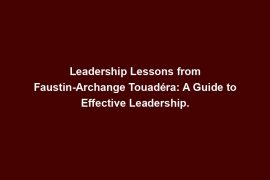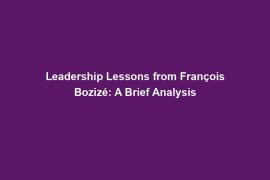Hey there, fellow history buffs! Today, we’re diving into the fascinating world of Jean-Bédel Bokassa, the enigmatic leader of the Central African Republic. From humble beginnings to a reign marked by extravagance and controversy, Bokassa’s story is a rollercoaster ride of power, authority, and ultimately, downfall.
As we unpack Bokassa’s leadership style, we’ll explore the delicate balance of authority as a double-edged sword. On one hand, his firm grip on power helped him solidify his regime and quash dissent. But on the other hand, his iron-fisted rule resulted in grave human rights abuses and a lack of accountability. It’s a cautionary tale of the dangers of unchecked authority and the importance of transparency in leadership.
Moreover, we’ll delve into the concept of hubris, which proved to be Bokassa’s undoing. His grandiose coronation as Emperor and subsequent fallout with the international community serve as poignant reminders of the perils of ego and arrogance in leadership. Through his story, we learn the vital lesson of humility and the necessity for leaders to stay grounded in reality.
So, buckle up as we embark on this journey through history, drawing valuable insights from Bokassa’s rise and fall. By reflecting on his triumphs and tribulations, we can glean essential leadership lessons that are as relevant today as they were during his tumultuous reign. Let’s unearth the wisdom hidden in the annals of the past and apply it to our own leadership journeys. Get ready to be inspired and enlightened as we unravel the complexities of authority and hubris in leadership. Let’s dive in!
Authority: The Double-Edged Sword
Now, let’s talk about authority – a powerful tool in a leader’s arsenal but one that can quickly become a double-edged sword if not wielded carefully. Jean-Bédel Bokassa knew how to use authority to his advantage. His authoritative leadership style helped him consolidate power and maintain control over his regime with an iron fist.
By exercising strict control over his subordinates and squashing any form of dissent, Bokassa was able to rule with an iron grip. However, this unchecked authority came at a cost. The suppression of dissent led to a lack of accountability within his government, paving the way for human rights abuses and corruption to run rampant.
As we look at Bokassa’s reign, it becomes clear that while authority can be a powerful tool for a leader, it must be balanced with transparency and accountability. Leaders must be willing to listen to differing viewpoints, encourage open dialogue, and hold themselves accountable for their actions. Without this balance, authority can quickly morph into tyranny.
Lessons Learned: Balancing Authority with Transparency
So, what can we learn from Bokassa’s authoritarian rule? It’s essential for leaders to strike a balance between wielding authority and fostering transparency in their leadership style. Transparency breeds trust and fosters a culture of accountability, preventing abuses of power and ensuring the well-being of all those under the leader’s charge.
By recognizing the need for transparency and accountability, leaders can avoid falling into the same traps that befell Bokassa. It’s not enough to simply command respect – true leadership requires a willingness to be held answerable for one’s actions and decisions. Authority must be tempered with humility and a commitment to serving the greater good.
As we continue to explore Bokassa’s leadership journey, keep in mind the delicate balance between authority and transparency. It’s a lesson that every leader can benefit from, regardless of their position or industry.
Hubris: The Downfall of a Leader
Now that we’ve covered the importance of authority in leadership, let’s delve into another crucial aspect of leadership that ultimately led to Jean-Bédel Bokassa’s downfall: hubris.
The Rise of Hubris
Hubris, derived from Greek mythology, refers to excessive pride or self-confidence, often leading to a downfall. In Bokassa’s case, his hubris was evident in his extravagant coronation as Emperor of the Central African Empire in 1977.
Imagine if you were given a small promotion at work and suddenly started acting like you were the CEO of a Fortune 500 company. That’s essentially what Bokassa did – he went from being a military officer to declaring himself Emperor, spending millions on his coronation ceremony while his people lived in poverty.
The Fall from Grace
As expected, Bokassa’s lavish lifestyle and abuse of power did not go unnoticed by the international community. The French government, who had previously supported him, began to distance themselves from his regime. The final straw came when reports surfaced of Bokassa ordering the killing of schoolchildren who refused to buy the expensive uniforms he had mandated.
His hubris had blinded him to the consequences of his actions, leading to a swift and brutal end to his rule. Bokassa was eventually overthrown in a coup d’état and his empire was disbanded.
The Lesson of Humility
From Bokassa’s story, we can learn a valuable lesson about the importance of humility in leadership. It’s crucial for leaders to remain grounded, to listen to feedback from others, and to be aware of their own limitations. Arrogance and ego can blind us to the reality of our situation, leading to disastrous consequences.
So, the next time you find yourself in a position of power, remember Bokassa’s story and strive to lead with humility and self-awareness. Your downfall may not be as dramatic as his, but the consequences of unchecked hubris can be just as damaging.
Stay tuned for the conclusion where we’ll recap the key leadership lessons we’ve learned from Jean-Bédel Bokassa’s reign.



